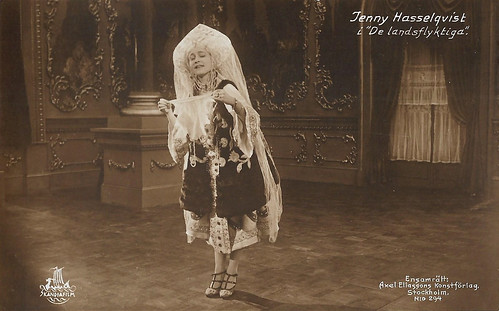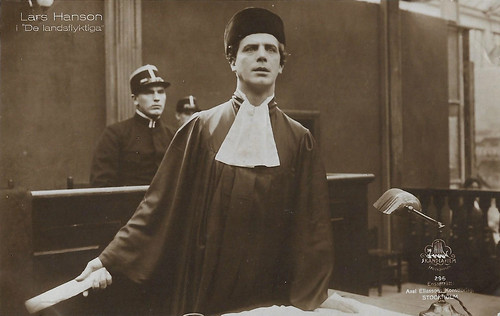
Swedish postcard by Ed. Axel Eliassons Konstförlag, Stockholm, no. 293. Photo: Skandia Film, Stockholm. Jenny Hasselqvist in De landsflyktiga/The Emigrants/The Exiles (Mauritz Stiller, 1921).

Swedish postcard by Ed. Axel Eliassons Konstförlag, Stockholm, no. 294. Photo: Skandia Film, Stockholm. Jenny Hasselqvist in De landsflyktiga/The Emigrants/The Exiles (Mauritz Stiller, 1921).
Why Mauritz Stiller became a Swedish citizen
De landsflyktiga (Mauritz Stiller, 1921) can be translated as The Emigrants. The film was released in the USA as In Self Defense by George Hamilton, Incorporated in 1922 and was also known under the title Guarded Lips. The British title was The Exiles. De landsflyktiga was shot in the studios of Filmstaden Råsunda with exteriors at Steninge castle, Stadsgårdskajen and other locations in Stockholm. The cinematographer was Henrik Jaenzon.
The film script by Mauritz Stiller and Ragnar Hyltén-Cavallius was based on Runar Schildt's short story 'Zoja' from 1920, which was published in the short story collection 'Häxskogen'. It was during the filming of De landsflyktiga/The Emigrants/The Exiles that Mauritz Stiller, who had been a Russian citizen since his birth in Helsinki, applied to become a Swedish citizen.
The wealthy Barantscheff family lives on the stately Staraja-Selo estate in the heart of Russia. Prince Ivan Ivanovich (Carl Nissen), his wife Ivanovna Stefanovna (Karin Swanstrom), their daughter Sonja (Jenny Hasselqvist) and son Yuri (Nils Ohlin), a lieutenant in the Russian Navy who is recovering at home after being wounded in the war.
The First World War is in full swing and storm clouds are gathering everywhere. The wealthy banker Andrei Andreyevich Myasoyedoff (Ivan Hedqvist) approaches the prince and proposes to sell the estate because of the troubled times. The prince takes the offer as an insult and refuses.
Myasoyedoff has also set his eyes on Sonya, but she has already brusquely rejected him. One day, Sonya, while driving alone, rescues the young revolutionary student Vladimir Alexandrovich Mikhailoff (Lars Hanson), who is being chased by the gendarmes.

Swedish postcard by Ed. Axel Eliassons Konstförlag, Stockholm, no. 295. Photo: Skandia Film, Stockholm. Jenny Hasselqvist in De landsflyktiga/The Emigrants/The Exiles (Mauritz Stiller, 1921).

Swedish postcard by Ed. Axel Eliassons Konstförlag, Stockholm, no. 296. Photo: Skandia Film, Stockholm. Lars Hanson in De landsflyktiga/The Emigrants/The Exiles (Mauritz Stiller, 1921).
Out of the darkness that oppresses us, a new Russia will one day arise
When the revolution breaks out, it is Vladimir who helps Sonja and her parents to escape across the border. The family settles in a major international city, perhaps Paris, and continues their former, carefree life of luxury, waiting for the revolution to be crushed so they can return to their former lives at home. But their inherited wealth quickly dwindles, and it is Myasoyedoff, who has also come there as a refugee, who helps them financially.
He has managed to bring most of his fortune with him and is already involved in big business. The student Vladimir, a refugee from his former comrades, also arrives. One fine day, the Barantscheff family finds itself on the rocks. But Myasoyedoff is happy to oblige if only Sonya would be a little more accommodating to him. But Sonja stubbornly refuses. In an upset scene, she rips off all the family jewels she wore to the evening's charity party and gives them as collateral instead of herself for the family's debt.
Myasoyedoff takes the jewels and smilingly adds that the pledge is due at the end of the year. On New Year's Eve, Myasoyedoff is found dead in his villa, with Sonya lying unconscious outside. Vladimir, now a lawyer, defends Sonja in court. She admits that she shot Myasoyedoff when he tried to rape her. Afterwards, she threw the revolver from the balcony. But no revolver has been found.
In a break during the last day of the trial comes the explanation. Vladimir confesses to Sonja during a visit to her cell that it was he who shot Myasoyedoff on behalf of his comrades. Myasoyedoff was spying on the emigrants on behalf of the Bolshevik government, and many of their relatives remaining in Russia had already been shot. Myasoyedoff was an informer, Vladimir was the real killer, and Sonya now holds his fate in her hands.
But Vladimir's defence speech in court for Sonja leads to her acquittal. She and Vladimir are united, and Sonja utters the film's final line, which it was hoped at the time would have a prophetic meaning: "Out of the darkness that oppresses us, a new Russia will one day arise, a Russia that we can both love."

Swedish postcard by Ed. Axel Eliassons Konstförlag, Stockholm, no. 297. Photo: Skandia Film, Stockholm. Lars Hanson and Jenny Hasselqvist in De landsflyktiga/The Emigrants/The Exiles (Mauritz Stiller, 1921).

Swedish postcard by Ed. Axel Eliassons Konstförlag, Stockholm, no. 298. Photo: Skandia Film, Stockholm. Lars Hanson and Jenny Hasselqvist in De landsflyktiga/The Emigrants/The Exiles (Mauritz Stiller, 1921).
Sources: Svensk filmdatabas (Swedish), Silent Era, Wikipedia and IMDb.
1 comment:
Truly beautiful postcards
Post a Comment